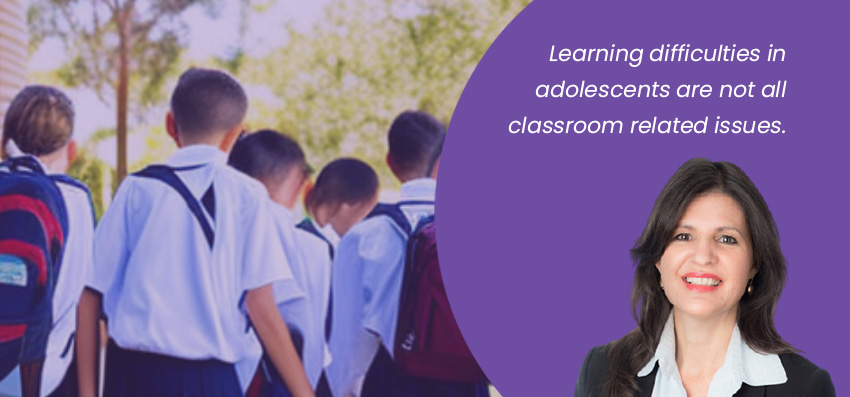February is back to school time in Australia. As we know, when children return to school, some might face challenges and often school refusal might be indicative of other issues. Parents are busy and these days, mostly both parents work so any behaviour changes can create family disruption. The summary below has been taken from a presentation I gave in 2021, entitled Learning difficulties in adolescents are not all classroom related issues:
Some important statistics
- Over 75% of mental health issues occur before the age of 25 (https://www.beyondblue.org.au/who-does-it-affect/young-people)
- 13.9% of children and young people (aged 4 to 17 years) met the criteria for a diagnosis of a mental disorder in the last 12 months
- One in ten young people aged 12-17 years old will self-harm
- One in 13 will seriously consider a suicide attempt
- One in 40 will attempt suicide ( almost one per classroom)
- One third (32.4 per cent) of all Aboriginal and Torres Strait Islander child deaths occurred due to suicide
- Suicide continues to cause the largest loss of life of young people in Australia (36% of all 18-24yr)
- Only 31% of young women and 13% of young men with mental health problems had sought any professional help
- 50% of mental illness emerges in adolescence
- Domestic violence contributes the most to the mental illness disease burden
- More families are accessing specialist homelessness services due to family and domestic violence: up by 32% in 2017 c.f. 2013
- The rate of children receiving child protection services has risen from 26 per 1,000 children in 2012–13 to 29 per 1,000 in 2017–18
Findings of National survey youth mental health 2015
Males more likely than females to have experienced mental disorders in the 12 months prior to the survey (16.3% compared with 11.5%).
9/10 young people with a severe mental disorder accessed support provided by the health and education sectors.
¾ young people with moderate impact problems accessed support.
Disorders that were most common and had the greatest impact on children and adolescents:
- Attention-Deficit/Hyperactivity Disorder (ADHD) (7.4%)
- Anxiety disorders (6.9%)
§ Social phobia
§ Separation anxiety disorder
§ Generalised anxiety disorder
§ Obsessive-compulsive disorder - Major depressive disorder (2.8%) 31.5% admitted to smoking cigarettes, using alcohol or drugs to help.
- Conduct disorder (Oppositional behaviour disorder) (2.1%)
Mental Health Guide
Here is a simple guide taken from the Royal Children’s Hospital website on adolescent Mental Health – Adolescents. View the guide here.
Associate Professor Magdalena Simonis AM is a Past President of the AFMW (2020-2023), former President of VMWS (2013 & 2017-2020) and current AFMW National Coordinator (2024-2026). She is a full time clinician who also holds positions on several not for profit organisations, driven by her passion for bridging gaps across the health sector. She is a leading women’s health expert, keynote speaker, climate change and gender equity advocate and government advisor. Magda is member of The Australian Health Team contributing monthly articles.
Magdalena was awarded a lifetime membership of the RACGP for her contributions which include past chair of Women in General Practice, longstanding contribution to the RACGP Expert Committee Quality Care, the RACGP eHealth Expert Committee. She is regularly invited to comment on primary care research though mainstream and medical media and contributes articles on various health issues through newsGP and other publications.
Magdalena has represented the RACGP at senate enquiries and has worked on several National Health Framework reviews. She is author of the RACGP Guide on Female Genital Cosmetic Surgery and co-reviewer of the RACGP Red Book Women’s Health Chapter, and reviewer of the RACGP White book
Both an RACGP examiner and University examiner, she undertakes general practice research and is a GP Educator with the Safer Families Centre of Research Excellence, which develops education tools to assist the primary care sector identify, respond to and manage family violence . Roles outside of RACGP include the Strategy and Policy Committee for Breast Cancer Network Australia, Board Director of the Melbourne University Teaching Health Clinics and the elected GP representative to the AMA Federal Council. In 2022. she was award the AMA (Vic) Patrick Pritzwald-Steggman Award 2022, which celebrates a doctor who has made an exceptional contribution to the wellbeing of their colleagues and the community and was listed as Women’s Agenda 2022 finalist for Emerging Leader in Health.
Magdalena has presented at the United Nations as part of the Australian Assembly and was appointed the Australian representative to the World Health Organisation, World Assembly on COVID 19, by the Medical Women’s International Association (MWIA) in 2021. In 2023, A/Professor Simonis was included on the King’s COVID-19 Champion’s list and was also awarded a Member (AM) in the General Division for significant service to medicine through a range of roles and to women’s health.

